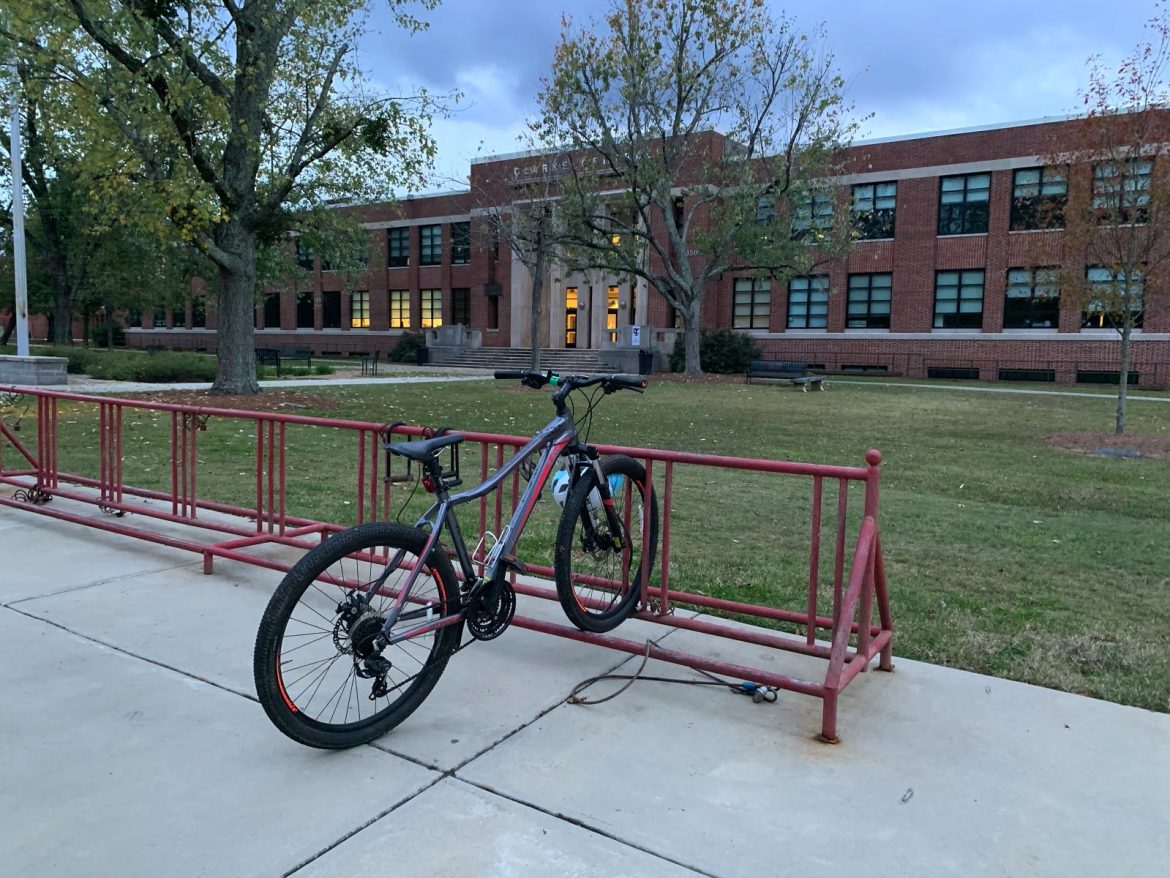A single bicycle is parked outside of the Clarke Central High School ceremonial entrance on Nov. 8. CCHS foreign language department teacher Ella Salt cycles to school every day but feels that the commute can be dangerous. “Parents need to feel that their kids would be safe (when) letting them cycle,” Salt said. Photo by Emma Scott
In a city with limited transportation options, biking gives many students freedom. The absence of bike lanes forces bikers into dangerous conditions.
There are sidewalks on either side and two lanes down the middle that run in opposite directions. That’s it. Milledge Avenue, the main artery that leads to Clarke Central High School, does not have a safe option for the many members of the CCHS community who rely on a bike to commute to school.
Milledge Avenue is notorious for its accidents. CCHS alumna Grace Byrne sustained a traumatic brain injury after being hit by a car while crossing the street on Milledge.
Many CCHS students are affected by the absence of bike lanes on a day-to-day basis. On their commute to and from school, they either have to ride illegally on the sidewalk where they will need to awkwardly maneuver past pedestrians and wait at crosswalks, or they must bike on the road adjacent to much speedier cars and attempt to stay aware of dangerous road conditions.
Most bicycle accidents in the United States are the result of cyclists and drivers not taking caution to share the road. According to a study conducted by the Journal of Advanced Transportation, 77% of bicycle conflicts on the road are due to vehicles disrespecting bicyclists’ right of way.
It has been established that sharing the road is not always easy. In order to clearly demarcate bicycles and motor vehicles, a road such as Milledge Avenue would need to have designated lanes.
For years, cyclists like CCHS foreign language department teacher Ella Salt have advocated for bike safety in Athens, but motor vehicles are always the priority. Many CCHS cyclists make do with their options on Milledge Avenue, but if they stood up, wrote to commissioners, and attended meetings of organizations that advocated for bike safety, a safer environment would be created for all.
“I tried to start up a group called ‘Commute by Bike Coalition’ and to encourage students to get out and make their voices heard. Write to the commissioners, write to the Flagpole, go to the meetings,” Salt said. “I would love to have students come have a group (at Clarke Central). I would be happy to sponsor pizza after school and talk about something we could do to get the attention of commissioners and the Planning Commission.”
There is hope. The Athens In Motion Commission was recently appointed by the Athens-Clarke County Mayor and City Council. AIMC seeks to create a safe and connected network of pedestrian and cyclist facilities in Athens and to encourage eco-friendly transportation.
Bike lanes have not been a focus of the ACC government because funding has been poured into benefitting motor vehicle drivers, who pay taxes in order to operate their cars, and many are fearful that cyclists will slow traffic flow.
It is true, taking space away from cars would slow traffic in many parts of Athens, but Milledge Avenue is already bustling with bicyclists, pedestrians and buses, and there are many other routes available for cars here. The most important thing is that those who are not riding in a car can travel safely.
Promoting diverse transportation methods would foster active lifestyles and create a safer environment for all. Even those who do not cycle to school should care about this issue because it has the potential to create a world where humans — instead of taxes, motor vehicles and fossil fuels — are put first.
